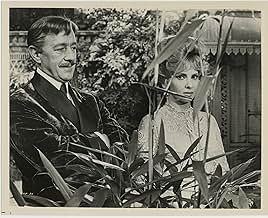Aggiungi una trama nella tua linguaMonsieur Feydeau has writer's block, and he needs a new play. But he takes an opportunity to observe the upper class of 1900 Paris, Monsieur Boniface with a domineering wife, and the next-do... Leggi tuttoMonsieur Feydeau has writer's block, and he needs a new play. But he takes an opportunity to observe the upper class of 1900 Paris, Monsieur Boniface with a domineering wife, and the next-door neglectful husband Henri with a beautiful, but ignored wife, Marcelle. Henri traces arc... Leggi tuttoMonsieur Feydeau has writer's block, and he needs a new play. But he takes an opportunity to observe the upper class of 1900 Paris, Monsieur Boniface with a domineering wife, and the next-door neglectful husband Henri with a beautiful, but ignored wife, Marcelle. Henri traces architectural anomalies (most ghost sounds are drains), and plans a night at the Hotel Paradi... Leggi tutto
- Regia
- Sceneggiatura
- Star
- M. Martin
- (as Douglas Byng)
- Hotel Guest
- (as Edra Gale)
- Policeman Bringing Convocation to Henri Cotte
- (non citato nei titoli originali)
- Policeman in Hotel
- (non citato nei titoli originali)
- Policeman in Hotel
- (non citato nei titoli originali)
- Policeman in Hotel
- (non citato nei titoli originali)
Recensioni in evidenza
Nine years later, the same Peter Glenville brought his superb adaptation to the screen for MGM with Alec Guinness in the Bert Lahr role and Gina Lollorigida bringing her all too seldom seen comic timing (check out her wonderful 1961 boulevard comedy "Come September" with Rock Hudson and Walter Slezak) to the Angela Lansbury role. Even Broadway cast member Douglas Byng (as Martin, a barrister) was along for the fun.
Of COURSE the plotting is "strained" - that is virtually the definition of farce - but the laughs flow without reservation.
Americans don't often get to see good European style farce which relies on situations, intellect and language as much as physical comedy. When we DO get a great farce like "Arsenic and Old Lace" or Noises Off", it is usually devoid of all sexual content - as if sex (not dirt, but good clean sex with all the ironies and insecurities attendant) weren't among the greatest sources of farcical situations.
Glenville gives us Feydeau at his most elegant - which is to say unashamedly sexual (with would-be adulterous spouses, potential lovers and innocents in a waltz of slamming doors and crowded corridors at the titular hotel), at the same time keeping the proceedings intrinsically moral and (for those foolish enough to care) absolutely clean.
The Belle Epoche settings fairly sing with civilized delight, and the brilliant farceurs like Robert Morley and Derek Fowlds (later known for his third lead in the brilliantly observed "Yes, Minister" and "Yes, Prime Minister" TV series) join the leads in a collective tour de farce.
Watch for Glenville himself in the unbilled role of Feydeau, observing and "writing" the proceedings, but by all means watch. This is all a stage to film transfer should be. You'll have a lovely time and feel the better for it.
In this film adaption of one of his more famous plays, the costumes and set designs are very good. The period feeling is impressive. The acting is so-so. Guiness has the best part and does the best acting. Others try hard, but the results feel half-baked. I blame this on the direction, or more likely the lack thereof.
Fans of classic farce, screwball comedy and periodic portraits will be delighted. A couple of in-jokes related to Feydeau's works can be found which will please literature scholars.
Such delightfully histerical lines are just the beginning of the fun.
I first saw this during my college days when I was a projectionist at the local movie house in Rexburg, Idaho. I dispaired of ever seeing it again. When I finally found it on VHS I was in (not on) ecstasy.
Lo sapevi?
- QuizDerek Fowlds, who played Maxim, recalled how one day on set, he told Gina Lollobrigida she had "the most beautiful eyes he had ever seen." She simply looked him up and down and walked off and never spoke to him again. Alec Guinness also disliked Ms. Lollobrigida, and the two rarely, if ever, spoke.
- BlooperThe women do not wear the correct type of shoe. In this period - late Victorian to WWI - women wore high buttoned boots as daily wear.
- Citazioni
Benedict Boniface: I'll show you what a man should be. Strong, tender and terrible in his passion.
Marcelle Cot: Well, Monsieur Boniface! You may be rather plain, but you certainly have a way with women!
- ConnessioniFeatured in Discovering Film: Gina Lollobrigida (2015)
- Colonne sonoreMain Title
Written by Laurence Rosenthal
I più visti
- How long is Hotel Paradiso?Powered by Alexa
Dettagli
- Tempo di esecuzione
- 1h 38min(98 min)
- Proporzioni
- 2.35 : 1





























